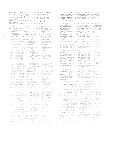 however, 'Lady' did not show quite the same sort of preoccupation with religion that was to mark Dr. Linebarger's later work. Faith was a very personal matter to Helen America and the "religious fanatics" she carried to New Earth. It was not something of ,,social significance" - or even specifically Christian, for all one could derive from the text.
however, 'Lady' did not show quite the same sort of preoccupation with religion that was to mark Dr. Linebarger's later work. Faith was a very personal matter to Helen America and the "religious fanatics" she carried to New Earth. It was not something of ,,social significance" - or even specifically Christian, for all one could derive from the text.
Although a strong believer in Christianity, Dr. Linebarger had never, up to this timet used his science fiction to carry a religious ,message# - not explicitly in any case. He experimented with mysticism in two of his manuscripts in 1946 and 1955. But he himself wasn't satisfied with the first and Gold did not like the second. 'Angerhelm'! which took a seemingly jaundiced view of the Hereafter, was not intended as part of the Instrumentality canon, and Dr Linebarger regarded 'Fife of Bodhidharma' as fantasy more than ~.F.
Science fiction writers traditionally have tended to keep their religious convictions -if any -out of their science fiction. For example, it would be difficult, if not impossibleI to derive Murray Leinster's Catholicism or Stanley G. Weinbaum's Judaism from anything they wrote. Some, however - in particular, Walter A. Miller - have preached their faith quite explicitly.
Dr. Linebarger's transistion from one mode of writing to the other came in a specific year - 1960 - and for a very specific reason.
For yearsT Dr. Linebarger's physical condition had been poor - he was always having trouble with his digestive system, and was in and out of hospitals for operations. Since his childhood accidentt he had had only one eye. In fact, the only way he got into the U.S. Army in World War II was to use his position as Far Eastern specialist on the Operation Planning and Intelligence Board to write up specifications for an operative in China that he himself Was the only man able to qualify under. He once astounded guests at a dinner party by taking ~-- out to drink a glass of hydrochloric acid to make his stomach function properly.
The time he spent with doctors and hospitals no doubt had something to do with the medical background in several of his stories - from Haberman operations in 'Scanners Live in Vain' to the sailors wired into their ships in 'The Lady Who Sailed the Soul'.
But in 1960T Dr. Linebarger's condition took a turn for the worse. He suffered a whole series of major Illnesses - one after another. "He almost died several times," according to Mrs. Linebarger, "It was awful."
"That was the year he wrote OLD NORTH AUSTRALIA....-
OLD NORTH AUSTRALIA was the first novel he had written in ten years, and his first attempt at a science fiction novel (though some might count ATOMSK). It is important to understand that this story of the Norstrilian
boy, Rod McBan, and his encounter with the Lords of the Instrumentality and the under-people on Old Earth, preceded all the other stories published after 1960 - even 'Alpha Ralpha Boulevard', and 'Mother Hitton's Littul Kittons'.
In its first draft, the novel ran to at least %20,000 words -Pohl, who was to publish the extracts The Boy Who Bought Old Earth and The Store of Heart's Desire in Galaxy and if four years laterT never saw this version. And Donald Bensen, who was editor of Pyramid when the novel was published in two books as THE PLANET BUYER and THE UNDERPEOPLE, indicates that some material was left out even then.
Mrs. Linebarger indicates that the delay in publication of OLD NORTH AUSTRALIA was due to her husband's being dissatisfied in some way with the work and wanting to polish ~t up. It is not certain whatT if anyt serious revisions were madeT however.
OLD NORTH AUSTRALIA represented a abrupt departure from the type of science fiction Dr. Linebarger had written in the past. Where the decadent society of the Insturmentality had been in the background in previous stories, it now held center stage. Gone were the "outsider" heroes who had found themselves in strange vocations. Protagonists now were the Lords of the Instrumentality themselves and those: who opposed them in a world of politics and intrigue.
It goes almost without saying that Dr. Linebarger's experiences with psychological warfare and foreign intrigues served him in creating the background for the epic struggle involving the InstrumentalityT Old North Australia and the Holy Insurgency of the under people,
The Lords of the Instrumentality are very much "insiders" - but they have one trait in common with the "outsider" heroes of before: a sense of vocation. Their vocation, however, is not for any particular profession or creed, but for mankind itself. At once noble and corrupt, ruthless and benevolent, their self-assigned mission down through the ages has been to guide mankind toward their goal of perfection.
But their ideal of evolution is not shared by the rigid, ascetic society Of Old North Australia. Nor by the Holy Insurgency.
Here the religious message comes in : the coming of Rod McBan is supposedly in fulfillment of a prophecy. And the E'Telekeli, leader of the "Aitch Eye" is, if not a Christ figure, at least the primate of a very orthodox Christian church. His daughter E'lamelanie, pursues the "devotional" life. And there are to be other heroes and heroines from Casher O'Neill and T'Ruth to D'Joan and the Hunter, who either have or acquire a religious calling.
There are other changes. McBan's
Document scaning and conversion provided by Peter Barker
Updated May 12, 2015. If you have a comment about these web pages please send a note to the Fanac Webmaster. Thank you.